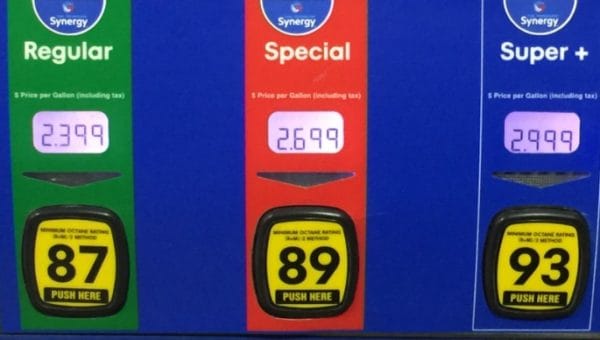Do You Really Need Premium Gas? Here’s How To Know

Don’t over pay if you don’t have to.
Premium is a powerful word. It suggests you don’t settle for second-best.
Some drivers buy premium gas, because they care about their investment. They want their car to have the absolute best fuel available. Does that sound like you? If so, I’ve got some bad news. Unless your owner’s manual says otherwise, buying premium gas is a waste of money.
AAA tested the impact of premium gas on performance, emissions, and fuel economy. It didn’t provide any benefit. 16.5 million Americans bought premium gas in the last year, even though their vehicle didn’t need it. Result: They wasted $2.1 billion dollars in the process, which adds up to an average of $127 per driver. How many yoga classes could you attend with that money?

Luxury rides like the 2016 Jaguar XF need premium. Photo: LeAura Luciano
Some cars–especially luxury and high-performance vehicles–do need premium gas
Car engines are made specifically for the type of fuel they require. Premium octane burns at a higher temperature than regular gas, because it takes more heat (energy/power) to achieve peak performance. Luxury brands like Porsche, Jaguar and Mercedes usually require premium. Here’s a list of every 2016 and 2017 model that requires premium gas.
It’s risky to put regular fuel into a car that requires premium. Fuel will not burn efficiently, which can result in a sticky carbon residue. The carbon is like plaque on your teeth. If you don’t brush for a day, nothing bad will happen. Slack off for a few months and you’ll get stuck with a root canal. Likewise, poorly burned fuel can lead to premature and more costly repairs.

We all want to save gas and money, can your car run on regular?
‘Recommended’ and ‘required’ are not the same thing
Often, it’s ‘recommend’ that a car use premium fuel, but not required. Think of how some food marketers capitalize on the word “natural” leading consumers to assume natural equals healthy, which of course is not necessarily true. You can’t really determine how healthy a food is until you read the label.
The same thing happens at gas stations. Premium gas is presented as a cleanse, detox, or tonic for your hard-working engine. Some marketing suggests premium gas is cheaper in the long-term, because it improves your engine performance and fuel economy. Unfortunately, these claims are exaggerated.
Is premium necessary for your car? Conduct an experiment to find out
Even though premium may be recommend for your car, you might be able to use regular gas. Here’s a simple test (and a little math) to find out.
Before you begin your fuel economy experiment, write down the number of miles on your odometer. This is your starting point. To keep it simple, I recommend fueling up on the same day every week. Subtract the previous week’s mileage from current mileage to calculate how many miles you traveled. Divide that total by how many gallons it took to replenish your tank. This number is your MPG.
Follow these steps for at least a month with both regular and premium gas to confirm your findings. For one month, fuel up with regular gas. Record your mileage at each pit-stop. Save receipts in an envelope so you can easily keep up with the costs. The following month, fuel up with premium gas and repeat the same process. Then, compare the cost and MPG of running on regular fuel versus premium to see if buying premium provided more miles on a tank of gas.
The bottom line may be performance, not cost
Even if you’re not getting a bump in MPG using premium, the cost difference should not be your only consideration. Listen to your engine. If you hear a knocking sound or acceleration feels sluggish when there’s regular fuel in the tank, that means it isn’t compatible with your engine. Switch to premium, even if it’s more expensive.
Still have questions? If so, drop them in the comments. Share this post with your friends so they can save money on gas, too.
